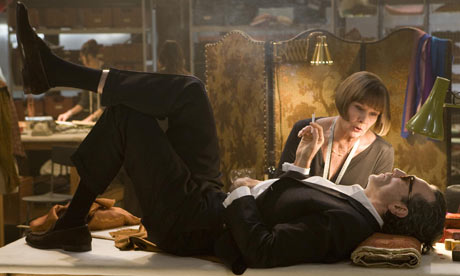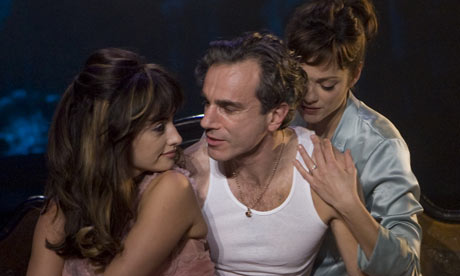Since it earned only two votes less than Up (which I've reviewed), I decided I'd review Nine nonetheless.
Nine, along with The Lovely Bones and Chéri from the unholy trinity of films from 2009 that I liked much more than the most.
I don’t find anything inherently dubious in the fact that I liked all three. However, my unreserved love of Nine makes me occasionally question my objectivity, the film was the one I was most excited to see last year in a way I wonder if I willed myself to like it. I’d seen 8 ½ once and my memory of it was not expansive. (like Alvodomar and Bergman, my knowledge of Fellini and other non-English directors is unfortunately sparse). I anticipated Nine because I’d had the Broadway Recording with the delectable Jane Krakowski on repeat ever since I ever found out that there was someone called Maury Yeston and read the book of the musical. From an adaptation perspective (using the musical and not Fellini’s film as the base) Nine is almost blasphemous. The bulk of the score remains (although key numbers are excised) but the screenplay bear little resemblance to the musical’s book. It is such that Nine (the film) most daringly inventive aspect is also its most exasperating.
It’s difficult to parlay my thoughts on Nine into a succinct or comprehensible review without sounding esoteric, supercilious or confused (hence this post). It’s understandable, Nine was notably panned by the majority or “important” people. Not since Le Divorce have I been so dismayed at the critical response to a film (that includes The Lovely Bones, Running with Scissors and Chéri) – incidentally that was another Kate Hudson piece with a cast to salivate over (Naomi Watts, Glenn Close, Leslie Carron, Stockhard Channing, Bebe Neuwirth). Apologies, I’ve digressed. Yes, Nine’s concept is so outlandish that it really is more abstract than realist, I’d even go as far as to approve its intentions and execution as something of an intricate piece of artwork…
Before I continue, though, I must express the slightest bit of confusion. It happened with Burton’s Alice in Wonderland and it happened with Marshall and Nine. Why are directors held accountable for the (perceived) flaws in a screenplay? With Nine the lines are admittedly more blurred. The quasi-reality of Guido’s musical consciousness becomes an enigma – one I’m not sure is the work of Marshall, Tolkin or Minghella (who’s dead and cant’ speak for himself). Perhaps, it’s some odd hybrid of all three. Though structurally Nine is only a distant relative of its stage incarnation (complete with Yeston’s approval, though) one of the things that some forget is that musical wise it’s difficult to make Lilli’s rapturous ode to French coalesce with the pseudo European pop beats of the dancing whores or the delightfully wordy and very Broadway opening number of Guido. In many ways, I expect the stage is kinder – we’d be more willing to accept the disparity in themes there. Cinema is different. Each song almost exist on different parts of the spectrum and ignoring the exception to the rule – consistency in musical forms is essential to a musical. Nine’s solution (a tentative word choice) lies blatant in the script – ten scenes in the life of a man. With the bulk of the original significance in the actual number 9 out of the film and with the eponymous number oddly absent, it’s any question that the film just wasn’t called Ten. add the eight principal vocalists together with Guido’s younger self and Dante and we’ve acquired the ten most important faces of the film. The bulk of the film occurs in the ten days leading up to the making of it, ten numbers are song: “Ten sequences, each one set in a different period”…
This amidst its supposed cheer (so very deliberate). Nine is not about Guido’s demise but Guido’s eventual epiphany in ten numbers. There is no thread to bind the ten episodes, but the man himself. One of the final shots of Nine is a picture of the actual film’s title card, only this time Guido is making it. Nine (the one we’re watching) is the actual Nine that Guido’s trying to create. Am I being naïve in seeing the film as a literal creation / therapy session for our protagonist? Up until the epilogue with him and Lilli precisely the sort of slightly incongruous, oddly charming, delightfully schizophrenic thing that the “new” Guido would create. Remember, all he can make now is a film about a man trying to win back his wife. Pity may not always lead to love, but it’s close enough and it’s just the sort of thing that Guido would make for Luisa.
Nine is so obviously NOT rooted in reality. Marshall not-so-subtly tells us from the inception. Isn’t it odd that Stephanie – a Vogue reporter that Guido has yet to meet (chronologically at least) appears in the overture which celebrates the women in Guido’s life? The prologue acts as a beginning of our relationship with Nine but it’s all happened before – we’re now getting to see it. Measure it against the second appearance of the ensemble (sans Luisa) and the significance of the roll-call becomes more obvious.
I had a greater respect for seeing Nine this time around. Before it was just thrilling to watch and such, but I found even more method in Marshall’s ostensible madness, amidst the original fun – well as fun as a morose rumination on talent wasted can be. It is such that Daniel Day Lewis’ first impassioned (misguided) plea for world dominance is final look at the completely decadent Guido that is only hinted at. Though it’s still not my favourite actual number (look to Fergie) or my favourite song (look to Nicole); I feel great fondness for that first song. The more I see Nine (and I’ve seen it many times now) the more I come to appreciate his performance. His sensibility is precisely the type we need for Marshall’s concept. It also makes me appreciate the placing of this number as the first song in the musical – we can almost group the songs chronologically. We move from the present – Guido’s “wanting” of appreciation, his “wanting” of pleasure with Carla (which is reciprocated) and Lilli’s “wanting” of the music, the life and the laughter. Lilli yearns for fun in the moment, but she casts the narrative backward. She explicitly warns him not to do that, “That’s death.”, but he’s not known for listening. He’s looking back to Saraghina – already past. Incidentally, Luisa is looking back too, living in Guido’s past (just as Stephanie is, oddly). Guido is a bit like a hollow, albeit affable man. There is nothing to him but his movies. “My husband makes movies.” That’s it. Stephanie is not enticed by Contini, she’s enticed by Contini’s Cinema Italiano. What happens when the talent fades? Even Saraghina’s passionate urging to Be Italian doesn’t tell us much. what is it to be Italian? I don’t think Guido knows either. He isn’t helped by the fact that his mother wonders, “Do you think that so many will love you like I do?” She doesn’t answer, but she thinks no – Guido thinks so too, that’s his problem – he can’t give all of himself because there’s nothing to give.
As we head into the final trio of numbers (the three that resonate the most, despite – or because of – their bleakness) Claudia seems to be looking back but she’s moving forward really. Kidman’s “I’d rather be the man” just might be the most layered line reading of the entire film (in retrospect, her Claudia is the film’s biggest enigma). It’s this time around I notice – for the first time – the potential play on words in “Unusual Way” . Guido has made her whole by making a “hole” in her. An unusual way? Definitely – that’s why she’s moving forward without him, like Luisa. Like Guido too, actually. Guido, the man, is leaving Guido, the artist. He thinks he’s reached the epiphany – he’s wrong. The movie’s not the problem. He is. He’s such a mess of conflicting emotions that he doesn’t realise that he can make this movie – everything he needs is around him. He needs to realise that by making Nine (the movie within the movie) – a bit of catharsis, really. Notice how in that final roll call he looks not once at his supporting cast. He only has eyes for himself (well, the younger incarnation of himself). He’s not necessarily a “better” man – but he has the ability to become a more focused “artist”.
I am curious, though; does Luisa take him back when the film is complete? She’s masochistic enough, probably. The thing is, everyone wants Guido to give them more – they want all of him. What they don’t realise is that he’s giving all that he has to give. Nine came off to many as cloying, turgid, uninspired and [insert negative adjective]. I’m the opposite. For me it’s difficult to separate Nine from its protagonist. I love it for that. Am I the only one?






No comments:
Post a Comment